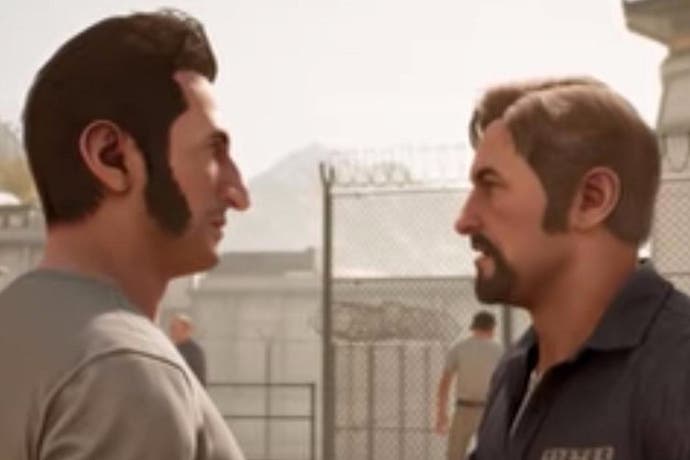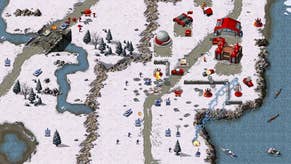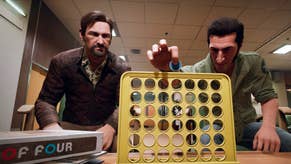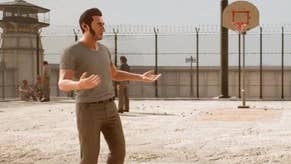A Way Out crafts a cocky new forced co-op concept
Couch play with Brothers developer Josef Fares.
A couple of weeks ago I played a new Escape the Room experience which blew my mind a little bit - where, part-way through, we were suddenly introduced to another, separate room to explore. The sudden change in gameplay forced our team to behave differently - coordinating to solve situations from different perspectives at the same time. It's a frantic feeling of fun I found again today, thousands of miles away, playing A Way Out - another game where two points of view unfold simultaneously, where players must communicate to progress.
Mixed in amongst the polished teasers and preening Let's Plays, A Way Out was an oddball standout from EA's press conference. Exclusively co-op, this early 2018 release is the next game from Brothers: A Tale of Two Sons writer and director Josef Fares. We've known of the project's existence since the end of last year, but after playing and loving the devastatingly emotional and understated Brothers, seeing A Way Out's brash and grizzled gameplay debut today was a genuine shock. Gone was the previous game's fantasy pastoral setting, replaced by dirty, urban 1970s scenes. Brothers 2, this was not.
Where Brothers' core gameplay conceit was that you controlled two characters with one controller, A Way Out inverts this by forcing two people to each pick up a pad. You can play in local co-op with someone in the same room, or alternatively by connecting online with a friend. But there is no online matchmaking, Fares confirmed at EA's post-event showcase today. "It's cocky," the excitable Fares told me. "But the experience is made to be co-op. This is the game."
Where the press conference trailer saw main characters Vincent and Leo attempting to break out from prison - in scenes reminiscent of The Shawshank Redemption and, well, Prison Break - the playable section we went hands-on with after EA's live show saw the criminal couple at large and attempting to rob a gas station.
The action begins with the pair in their car, planning the operation. Your first choice is which character out of the pair carries the gun. It's a moment where one player can choose to take the lead on the forthcoming scene, and an opportunity to try out the game's two-player dialogue wheel. You can only progress when both players agree on the same choice - something which Fares told me was intentional, to spark conversation between those playing.
Exiting the car and entering the gas station itself, the two characters are then free to split up - within the confines of the relatively small scenario environment - and action moves to a vertical splitscreen.
Numerous elements of the scene can be tinkered with before beginning the robbery proper. You can talk to, distract or threaten other customers, some of whom may later hinder your chances of a quick getaway if still present by running down the street and calling the police. You can also sabotage objects which could later prove useful to the gas station owners - disconnecting their landline, for example, means they cannot contact the cops once the robbery is underway.
Most of these items are flagged fairly obviously, although you can also interact with many items in the environment just for your own kicks. Fancy getting something to chew from the gumball machine, or cracking open a beer from one of the nearby fridges? Each character can do so, each with their own commentary to play up the pair's differing personalities. It's an important part of getting to know each character and having them feel like individuals, Fares explains, even if you're just goofing around doing "bullshit stuff".
When we're ready to get underway, Fares and I begin the robbery. Fares is in the front threatening the gas station owner. I join him, selecting to lean into the counter to add to the menace. My character, complete with 70s sideburns, gurns at the shopkeeper as she hands over a few coins from the till. "What about the safe in the back? You've got money there," Fares' character is now demanding. I take a break from the action and spin my character around aimlessly. I watch the game's splitscreen action, my character now in the background of Fares' camera view, twirling on the spot. It's a little odd.
Into the back Fares' character goes, heading to investigate the potential safe full of money. But there's a shop assistant back there, and he's suddenly grabbed Fares' guy in a headlock. It's not going well. Back outside the gas station, while still in our car, we agreed he could take the gun. I told him I trusted him, and now I was having to go back there to save him. Approaching the pair, I hammer the PS4 pad's square button to interact my fist into the shop assistant's face. Fares is free.
But with both of us now in the back of the gas station store, the game's narrative takes advantage of this fact by showing us a new, third splitscreen viewpoint - that of the original shopkeeper still out in the front, now unwatched, reaching for a gun behind the counter. On seeing this, I run back to the shop floor and manage to disarm her.
Over a couple of playthroughs I saw a couple of things which could happen next - depending who was in the shop, whether you disarmed the shopkeeper or disconnected the phone. Vincent and Leo can escape before the police get there - or be chased out by the cops if they are called, or warned.
It's difficult to tell how these difference will genuinely affect the story - or even if this is the intent. From what I can gather, A Way Out tells a linear tale which is simply meant to allow for player expression along the way - and to prompt the kind of discussion while playing myself and Fares had shared. Sure, it wasn't the glossiest of trailers on show today, but the experience of working together and communicating, of real-world interactions, will stick in my memory long after EA's flashier fireworks have faded.








.png?width=291&height=164&fit=crop&quality=80&format=jpg&auto=webp)




.jpg?width=291&height=164&fit=crop&quality=80&format=jpg&auto=webp)
